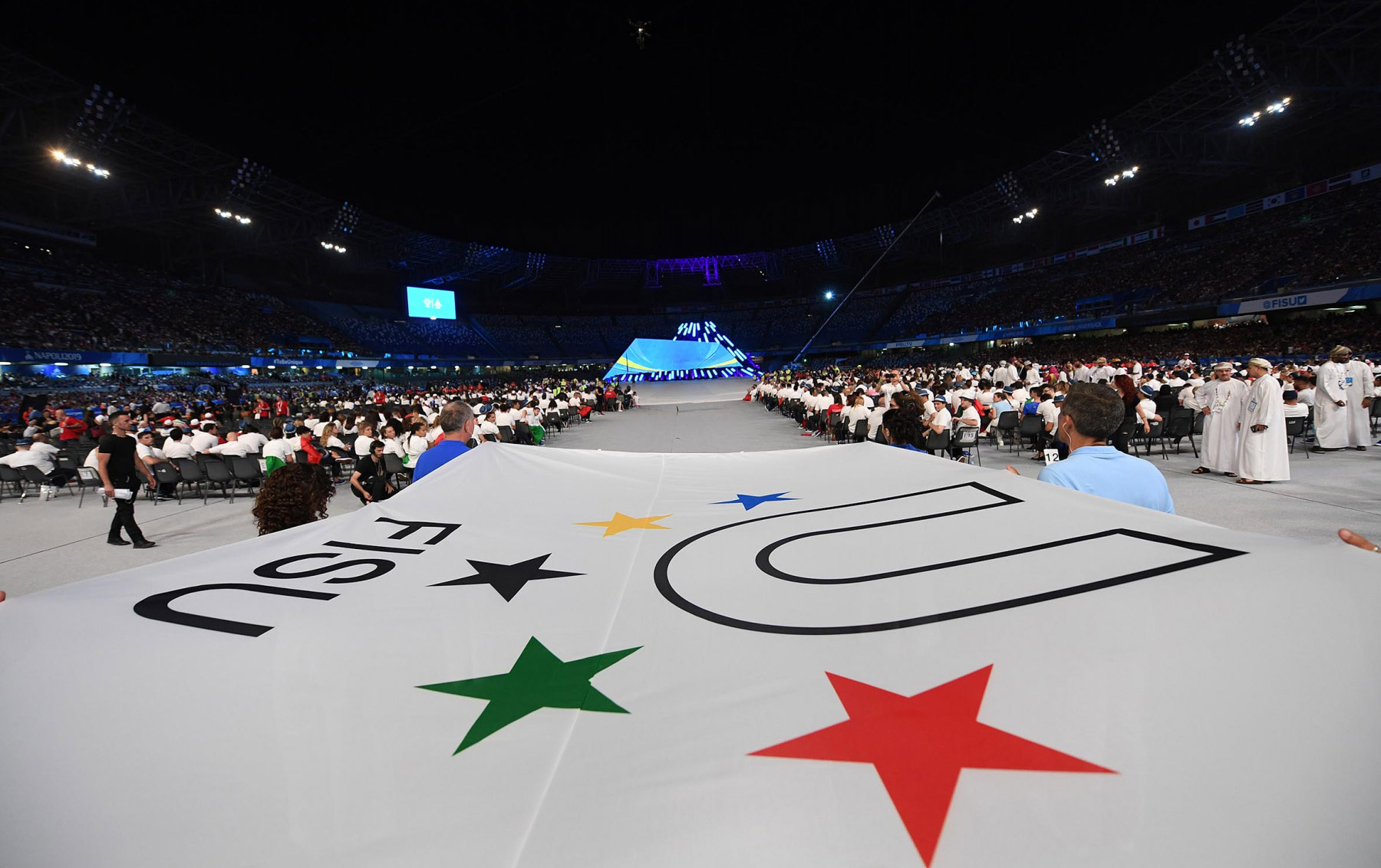 NAPOLI, 7 July – All eyes were on the future of the Universiades as FISU President Oleg Matytsin and Eric Saintrond held a roundtable discussion with accredited journalists covering the Napoli 2019 Summer Universiade in the morning of the event’s seventh competition day. As tennis players warmed up on the nearby clay courts and distance runners and race walkers worked out along a coastal pathway, the two leaders of university sport talked about where they saw the future of sport moving, and how the process of hosting major sports events such as the Universiade were evolving to be more flexible, cost-effective and focused on ensuring a sustainable legacy — for the student-athletes, the emerging events managers working at FISU events and for the host city.
NAPOLI, 7 July – All eyes were on the future of the Universiades as FISU President Oleg Matytsin and Eric Saintrond held a roundtable discussion with accredited journalists covering the Napoli 2019 Summer Universiade in the morning of the event’s seventh competition day. As tennis players warmed up on the nearby clay courts and distance runners and race walkers worked out along a coastal pathway, the two leaders of university sport talked about where they saw the future of sport moving, and how the process of hosting major sports events such as the Universiade were evolving to be more flexible, cost-effective and focused on ensuring a sustainable legacy — for the student-athletes, the emerging events managers working at FISU events and for the host city.
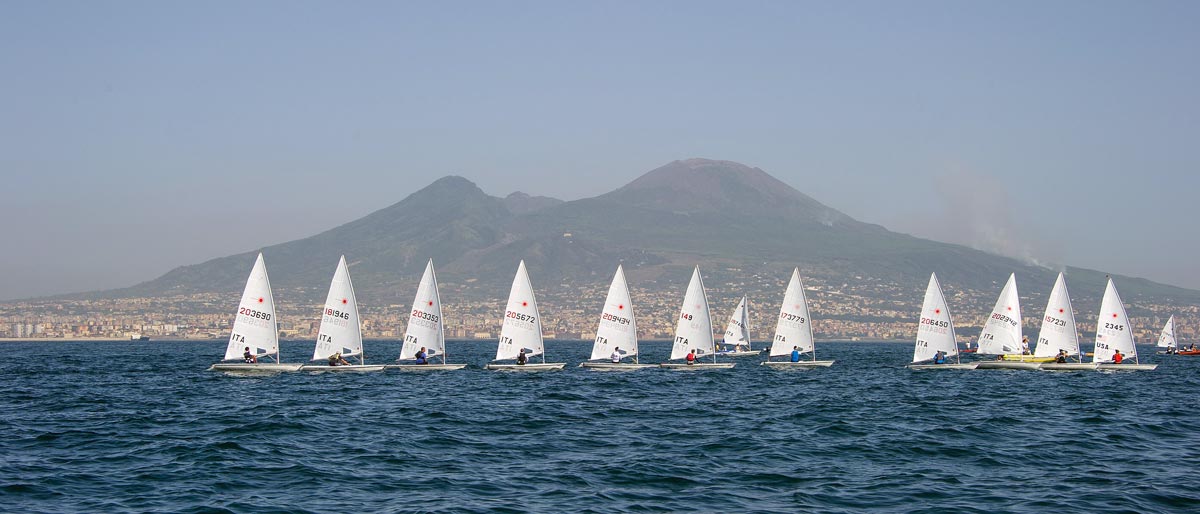
FISU President Oleg Matytsin, kicking off the event with a short overview of the Napoli 2019 Summer Universiade so far and how they fit into future of Universiades and how FISU has lined up future host cities through 2023 last week:
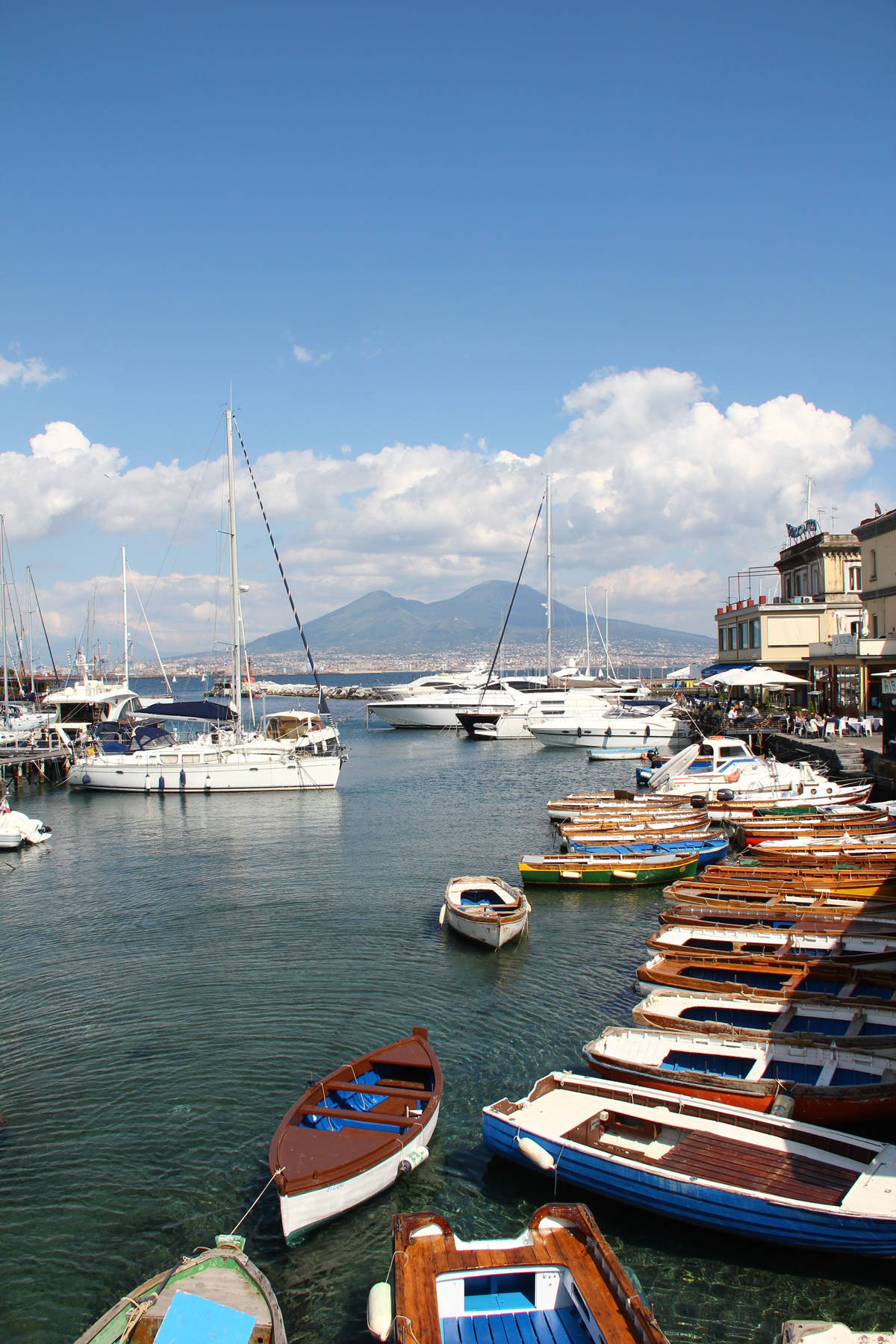 We want to give the students, the new generation, the chance to love sport and make sport a part of their lives.
We want to give the students, the new generation, the chance to love sport and make sport a part of their lives.
Speaking about the bright future of FISU, even today we have bright sunshine and good weather. With out 70 year history at FISU and you consider how many events we organise, how many cities, how many partners and how many athletes that are already involved in our family we are very confident about where we are and where we’re going in the future.
I’d like to congratulate my colleagues at Ekaterinburg for their successful bid to host the Summer Universiade in 2023. Already we have candidates for the 2025 Summer Universiade and I think we will soon have a potential Winter Universiade host city soon.
This means we have the programme for the Universiade, but it doesn’t mean that we only focus on this great event. We also initiate many other events including the International Day of University Sport, World University Championships and University World Cups and the Healthy Campus initiative.
Our goal is to organise more events for all students, and not just top athletes. There’s over 160 million students, so we should really think about their lives and how to organise daily physical activity on campus. We look to the future with open eyes. We have the initiative and the drive to be a leader on this field of play.
Eric Saintrond on FISU’s process for lining up future host cities:
We realised some years ago that having competitions between cities that are willing to organise a Universiade is not the best solution. At the end, when you have multiple candidates, you have multiple losers. And this is not nice because its quite amount of investment in time to prepare a bid. And its not very efficient, either. It is better to work in partnership with one city that three. We started this process many years ago and now many other federations hosting major sports events have gone away from the older bid candidature process.
Saintrond on candidature of Summer Universiade 2025
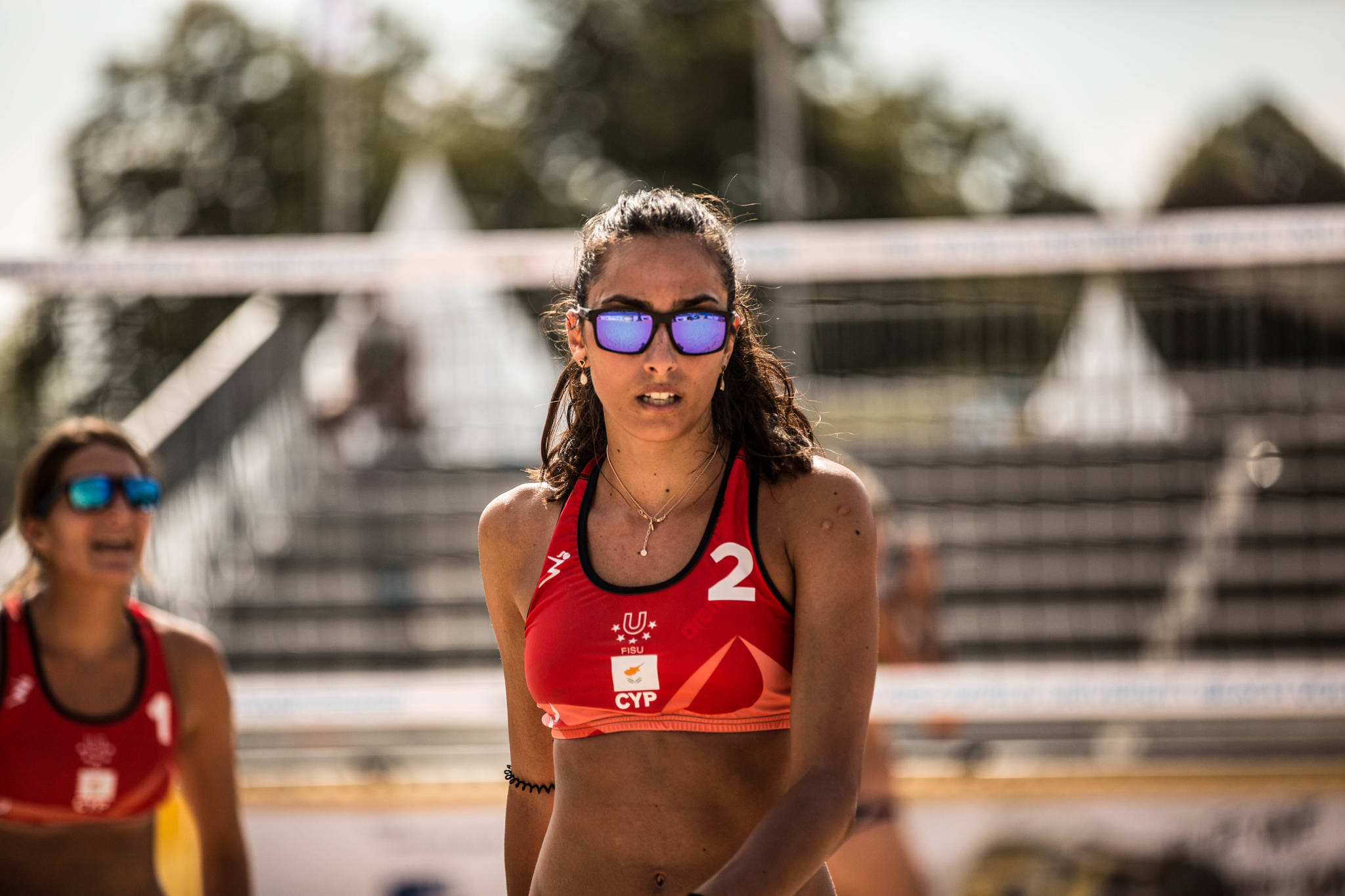 Germany successfully hosted the World University Beach Volleyball Championship in the Munich Olympic Park in 2018FISU has a very clear process; Germany presented a very strong bid and now we start a very close cooperation together. This means that from the very beginning the bidding book is not done by the host city alone. Now Universiade event planning is done through a very close and collaborative process between FISU and the local organising committee.
Germany successfully hosted the World University Beach Volleyball Championship in the Munich Olympic Park in 2018FISU has a very clear process; Germany presented a very strong bid and now we start a very close cooperation together. This means that from the very beginning the bidding book is not done by the host city alone. Now Universiade event planning is done through a very close and collaborative process between FISU and the local organising committee.
This new way allows for event adaptability. FISU is able to maintain the high games-time standards that the Universiade is known for and the local organisers are better able to put together a project that meets the specific needs of the city. Because each and every city on different continents have different objectives for hosting the Games.
Saintrond on hosting major sports events with a regional, or even national, approach:
At FISU, we’ve embraced this approach many years ago. Here in Naples, the events take place across three main cities: Caserta, Salerno and Naples. In Sicily, we had three main cities host the Summer Universiade in 1997. In 2015, we even organised the Winter Universiade across two countries, Spain and Slovakia, to much success. This is something we had done before, are doing today, and are very open to doing in the future.
Matytsin on organising major multi-sport events in one city:
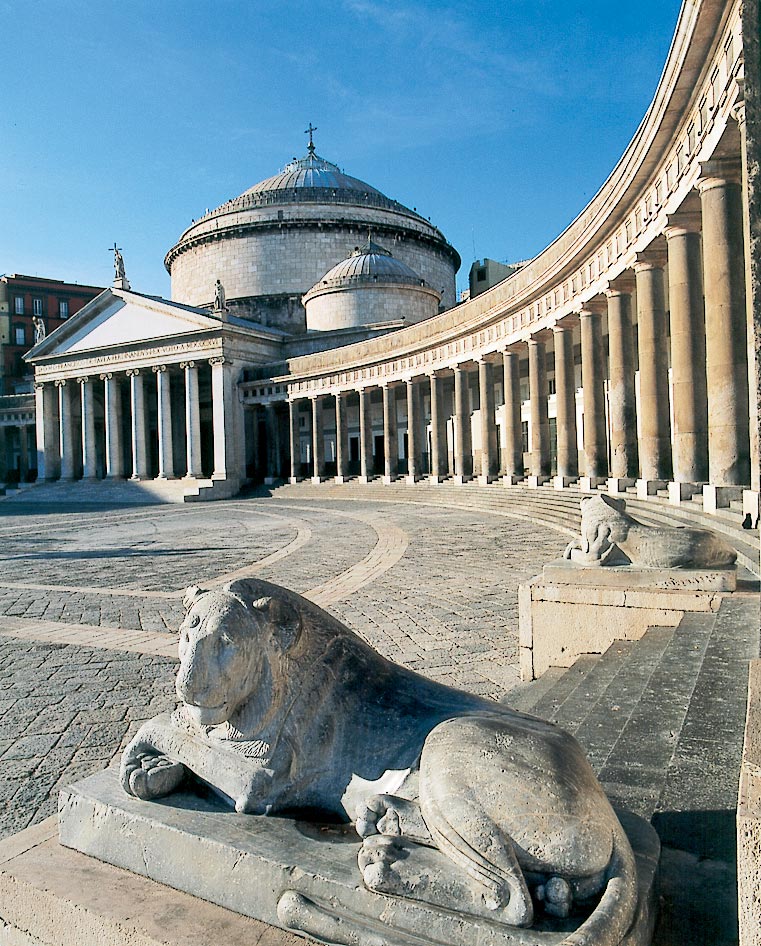 Using the regional approach, its still important that there’s one main athletes’ village, not just for the sport but to enhance the interaction of athletes across countries and sports. Having the chance to live together under one big roof helps unite students. This mutual respect between athletes and nations then gets built beyond just the competition arena; it’s built morning, noon and night.
Using the regional approach, its still important that there’s one main athletes’ village, not just for the sport but to enhance the interaction of athletes across countries and sports. Having the chance to live together under one big roof helps unite students. This mutual respect between athletes and nations then gets built beyond just the competition arena; it’s built morning, noon and night.
Of course, we have to adapt to each potential host and year-by-year. We have to live in reality and we have our feet firmly on the ground.
We have our own vision. We don’t copy or imitate any other organisation, but we are in contact with all the major players. This is what helps keep us providing the sports and events that resonate with student-athletes and host cities alike.
Saintrond on using existing venues:
We don’t want our host cities to build venues if they already have the facilities for a Universiade. Here, we had fantastic possibilities in Salerno and Caserta and this freed up Naples from building new venues and facilities. And its not always necessarily existing sports venues that can be used; in Ekaterinburg, we will use an expo centre for eight sports. This means we save eight venues. For athletes, this will be ideal as their village is beside this great venue. This, I am sure, will be the heart and the hub of this event for the athletes.
It’s having outcomes like these why we are working with the bidding cities from the very beginning. We are able to help them, based on our previous Universiade experience. In the end, the hosts put on a memorable event for the athletes that saves the city money and time.
Matytsin on being flexible and understanding the needs of potential host cities:
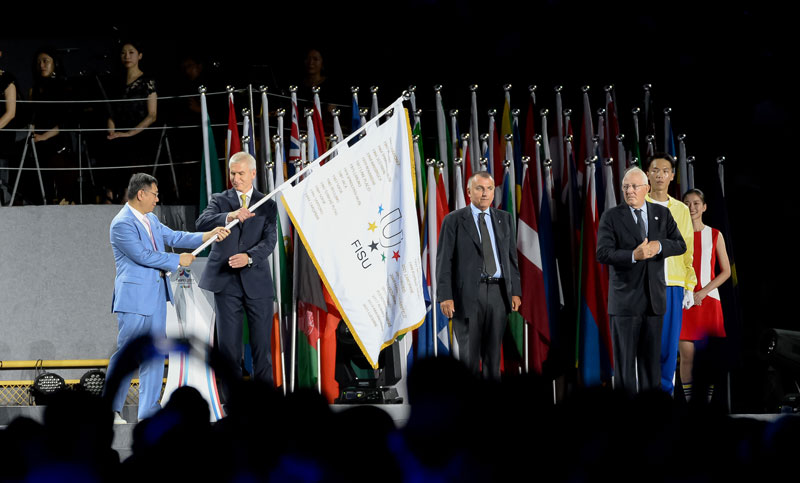 With FISU President Matytsin’s assistance, the FISU flag is passed from Taipei2017 to Napoli2019, the upcoming Summer Universiade hostOkay, we have the FISU minimum requirements. But each and every country has their own concept for the Universiade. For one country, it could be tourism. For another it could be be to develop both their university campus infrastructure and build event management skills in their students. From the beginning, we built the dialogue and help bring their concept to life. You want to develop your campus, or you want to develop the region, we are ready to adapt a little bit. We are all about coming to win-win-win outcomes.
With FISU President Matytsin’s assistance, the FISU flag is passed from Taipei2017 to Napoli2019, the upcoming Summer Universiade hostOkay, we have the FISU minimum requirements. But each and every country has their own concept for the Universiade. For one country, it could be tourism. For another it could be be to develop both their university campus infrastructure and build event management skills in their students. From the beginning, we built the dialogue and help bring their concept to life. You want to develop your campus, or you want to develop the region, we are ready to adapt a little bit. We are all about coming to win-win-win outcomes.
Saintrond on potential attribution timing for Summer Universiade 2027:
In my experience, four years preparation for a Universiade is the right amount of time. We haven’t opened up the bidding procedures for 2027, but we will look to do this in September next year, with FISU attributing these Universiades in 2022.
Saintrond on promoting sustainability and legacy to candidates and future host cities:
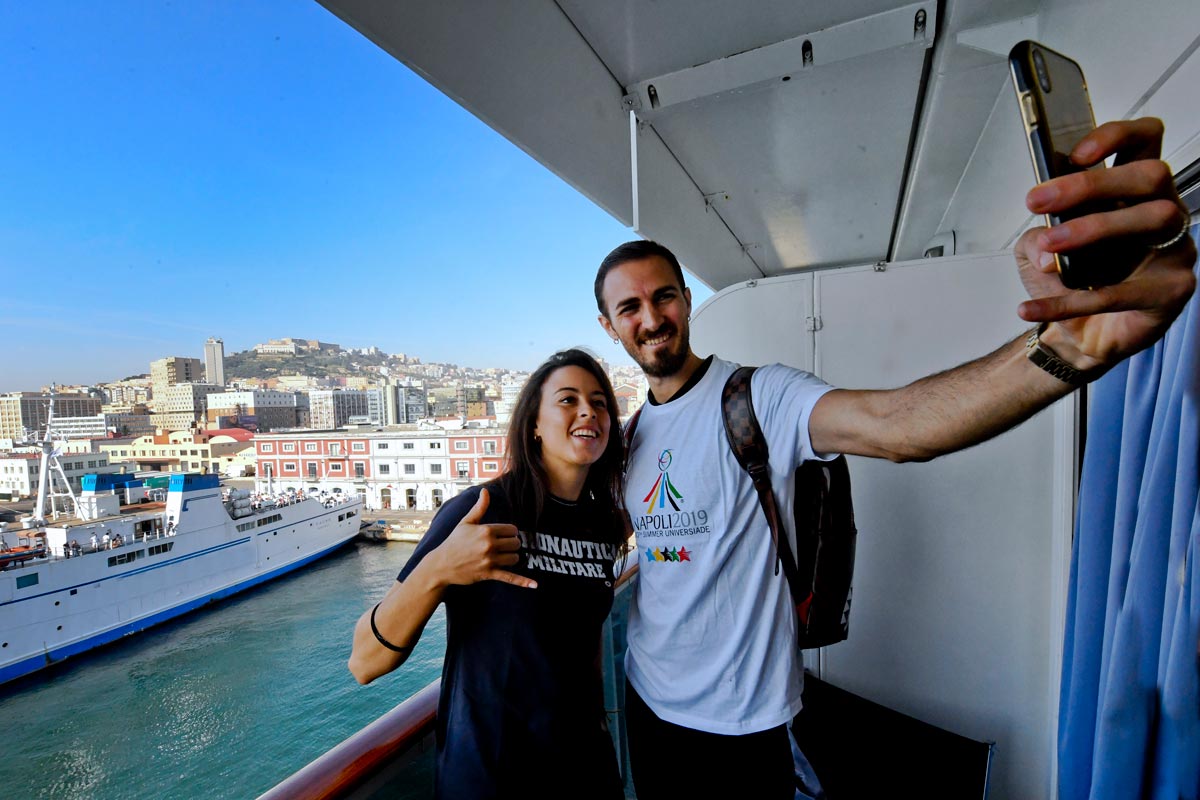 The Universiades are focused on finding sustainable practices — and to use the games as a platform for developing future managers in sport. This is also a practice tied to sustainability in sport. FISU is always pushing for the local organisers to recruit young people to be part of the team delivering the Universiade. Of course you need some people in the department with experience, but we really look for candidate cities that will recruit, rely on and develop students and recent graduates for the preparation of the games. This is the social legacy, and a part of putting on a sustainable Universiade. This is extremely important.
The Universiades are focused on finding sustainable practices — and to use the games as a platform for developing future managers in sport. This is also a practice tied to sustainability in sport. FISU is always pushing for the local organisers to recruit young people to be part of the team delivering the Universiade. Of course you need some people in the department with experience, but we really look for candidate cities that will recruit, rely on and develop students and recent graduates for the preparation of the games. This is the social legacy, and a part of putting on a sustainable Universiade. This is extremely important.
The FISU leaders on why Italians love the Universiade so much, having hosted the 11 times, 5 summer and 6 winter:
Saintrond: CUSI is a founder of FISU. Italy, Belgium, Germany, Switzerland, these are among the eight countries that created FISU in 1948 and became an official organisation in 1949. The system of university sports in Italy is very special; each and every university has a “CUS” — a Centro Sportivo Yniversitaire — and they organise their own sporting activities. This has created at each university a strong sports department with very good national university sports competitions amongst them. Every day during the school year, there’s competition going on around Italy. This has existed for more than 70 years, and this is helping to really drive Italy’s interest in university sport. From the beginning, they’ve had a good structure to run university sport in Italy.
Matytsin: Speaking of the time of Primo Niebolo as the president of this organisation, FISU met some challenges organising certain editions of the summer and winter Universiades. Italy was like a mother for international university sport. Anytime this global movement had some problems Italy always said, ‘okay, welcome to Italy. We will organise this edition of the event. We will provide a fantastic time and opportunity for the student-athletes.’

